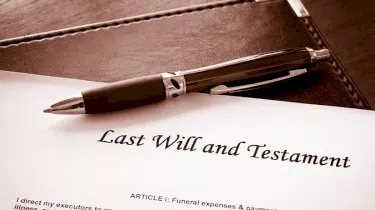Retirement
Most common estate planning myths that refuse to die
There’s a lot of misconceptions surrounding estate planning. Let’s look at the most common myths and set the record straight.
Most common estate planning myths that refuse to die
There’s a lot of misconceptions surrounding estate planning. Let’s look at the most common myths and set the record straight.

Estate planning continues to be one of the most misunderstood areas of financial planning with figures showing most Australians don’t see the importance of this process.
A study has found more than one in two Aussies don’t even have a will.
There are plenty of people who seek a financial plan but choose to leave out estate planning. When they do, estate planning attorneys observed that some people don’t think that an estate plan should not be planned in conjunction with their financial plan.
It’s important to realise that estate planning is an integral part of financial planning and not something that is separate from it. If properly researched, it is a pretty straightforward process. But many people are still unsure of what it entails, and they blindly allow common estate planning myths to influence their decisions.

To help clarify the importance of estate planning in the financial planning process, it’s important to know the truth behind some of the most common misconceptions about it. Let’s debunk the most common estate planning myths that refuse to die.
What are the most common estate planning myths?
Myth 1: Estate planning is only for the rich.
People believe that estate planning is something that will only benefit those who have a high net worth. This is probably the most common estate planning myth – and it is a myth.
Everyone needs an estate plan. If you own property and assets or you have loved ones that depend on you to provide for them, it means that you do have an estate and you need a plan. It is something that everyone needs to tackle regardless of their estate size. If you have a bank account, jewelries, a car, properties or any valuable item under your name, you should plan ahead what will happen in case you pass away or in the event that you become mentally incapacitated in your lifetime.
More importantly, if you have a spouse, minor children or other dependents, having an estate plan is critical. It will protect their interests and their future financial needs. It will also help them have an easier transition when you pass away. During your family’s time of grief, money is the last thing you want them to worry about.
Myth 2: Having a will is enough.
A will is a legal document that provides instructions on how your property and assets will be distributed after your death. While it is an excellent way to make sure that your wishes following your death are followed, it has limitations that you may not have considered. For example, there are certain assets that may not be covered by your will. These include life insurance policies and your superannuation. Any property or accounts that you jointly own also cannot go in a will.
In addition to your will, you should talk with your estate attorney to draw up other important legal documents to protect your assets and make sure that the welfare of your beneficiaries and/or heirs are prioritised. These may include a power of attorney, a living will, enduring guardianship of minor children or a trust. It will depend on your situation and what scenarios you may be preparing for, so make sure to have a thorough discussion with your attorney about what kind of protection and other measures you may need to make sure your estate will be properly managed.
Myth 3: It’s too early to plan my estate.
Some people have a misconception that only old people need estate plans. They think that they have plenty of time and that estate planning should be tackled when they’re at an old age.
But the truth is life is unpredictable. While estate planning seems like a “someday task”, it’s better to do it “too early” than to be too late. Just because you’re young doesn’t mean bad things can’t happen to you. Grim as it may sound, you must be realistic about the possibility of sudden tragedies occurring.
Unexpected events aside, estate planning is not just about planning for what will happen after your death. A comprehensive estate plan will include not just a will, but also healthcare directives, power of attorney documents and legal documents relating to minor children.
Don’t wait until you are older to create an estate plan, and it’s encouraged to work on it as early as possible. No one wants to consider the idea of becoming incapacitated or disabled, but it is always better to be prepared.
Myth 4: It’s easier and cheaper to do estate planning on my own.
At first glance, the important documents needed for a good estate plan are relatively simple to draw up. The legal standards that need to be met are usually easy to achieve and include basic requirements. To save money, people often choose to draft their own wills and use other estate planning tools on their own without consulting an experienced estate planning lawyer. However, saving the attorney’s fees by choosing to DIY your estate planning can end up being more costly.
Knowing how to make a will, a living will or a trust is much more different than creating the document itself. When it comes to any kind of legal or financial planning, the costs you need to take into account must be both from the initial expenses and the future costs and savings. With this said, you should consider the costs associated with not having a plan, or having a plan that is either incomplete or flawed.
Myth 5: I don’t need to change my estate plan once it’s done.
Planning is never a “once and done” task. Your life situation, preferences and goals change over time and may also be affected by outside influences (e.g. financial market movements, tax law changes, major economic events). What if you choose to get married or to divorce? What if you welcome another child into your life or you move to another city? What if your spouse, who is your main beneficiary, dies unexpectedly? All of these changes need to be reflected in your estate planning.
You should update your estate plan following major life events. Review your plan to include the necessary changes. At the very least, consider reviewing your plan every three to five years to make sure it still expresses your wishes.
Conclusion
If you’re like most people, you may not be comfortable discussing your mortality. Yet being a responsible adult requires us to do tasks that we might not want to do, and estate planning is one of them. By laying these common estate planning myths to rest, you can begin taking the first step in the right direction in ensuring that your affairs are in order after you pass away.

Estate planning
Turning inheritance into impact: The once-in-a-generation opportunity facing Australian families
Australia is on the brink of a seismic shift in wealth distribution, with more than $3.5 trillion expected to be transferred from Baby Boomers to Gen X and Millennials in the next two decades. This ...Read more

Estate planning
Australians encouraged to review their estate plans
Individuals should make sure their current estate plan is up to date. Read more

Estate planning
Why would a person want to set up a trust?
Why would a person want to set up a trust? We list down the reasons that may motivate you to call your attorney today. Read more

Estate planning
Will v trust: Which is best for you?
Should you create a will or a trust? Learn about their differences to know which is the best option for your estate planning. Read more

Estate planning
Executor of will and power of attorney: What’s the difference?
What is the difference between an executor of will and power of attorney? Let’s discuss their roles and why they are both important tools in estate planning. Read more

Estate planning
When is the best time to start estate planning?
One of the biggest misconceptions about estate planning is that you should start developing one only when you’re old. We discuss why you should create one as soon as you can. Read more

Estate planning
Advisers warned on limitations with life expectancy estimates
Jeremy Cooper has highlighted some of the limitations in using average life expectancies when planning retirement income for individual SMSF clients. Read more

Estate planning
Deadly estate planning mistakes and how to overcome them
Estate planning can be a complex process. Here are some of the mistakes you should avoid when getting your affairs in order. Read more

Estate planning
Turning inheritance into impact: The once-in-a-generation opportunity facing Australian families
Australia is on the brink of a seismic shift in wealth distribution, with more than $3.5 trillion expected to be transferred from Baby Boomers to Gen X and Millennials in the next two decades. This ...Read more

Estate planning
Australians encouraged to review their estate plans
Individuals should make sure their current estate plan is up to date. Read more

Estate planning
Why would a person want to set up a trust?
Why would a person want to set up a trust? We list down the reasons that may motivate you to call your attorney today. Read more

Estate planning
Will v trust: Which is best for you?
Should you create a will or a trust? Learn about their differences to know which is the best option for your estate planning. Read more

Estate planning
Executor of will and power of attorney: What’s the difference?
What is the difference between an executor of will and power of attorney? Let’s discuss their roles and why they are both important tools in estate planning. Read more

Estate planning
When is the best time to start estate planning?
One of the biggest misconceptions about estate planning is that you should start developing one only when you’re old. We discuss why you should create one as soon as you can. Read more

Estate planning
Advisers warned on limitations with life expectancy estimates
Jeremy Cooper has highlighted some of the limitations in using average life expectancies when planning retirement income for individual SMSF clients. Read more

Estate planning
Deadly estate planning mistakes and how to overcome them
Estate planning can be a complex process. Here are some of the mistakes you should avoid when getting your affairs in order. Read more










